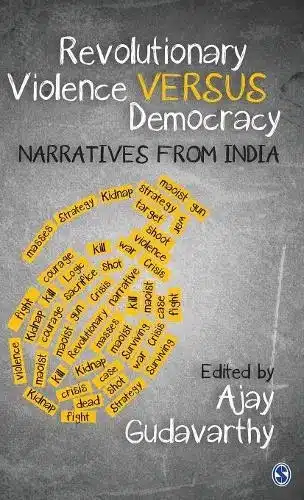
Save: 25%

Save: 25%
Revolutionary Violence Versus Democracy: Narratives from India
Publisher:
| Author:
| Language:
| Format:
₹825 ₹743
Save: 10%
In stock
Ships within:
In stock
| Weight | 410 g |
|---|---|
| Book Type |
ISBN:
Page Extent:
This book focuses on the interFace between democracy and violence, with specific reference to revolutionary strategies and mobilisations. Revolutionary Violence Versus Democracy: Narratives from India explores the armed conflict in India’s ‘Red Corridor’, where Maoists have been employing militant-revolutionary strategies to implement an alternative model of development. It studies this model, the purpose of which is to ensure the inclusion of impoverished tribals considered dispensable by mainstream political parties. Maoists feel that capture of State power is essential for revolution. State-sanctioned extra-judicial violence is common in the tribal belt??Maoists use strategies that challenge the State’s monopoly over the use of violence. This first-of-a-kind book reflects on revolutionary strategies, such as kidnaping, in terms of their validity in democratic mobilisation. Based on extensive field data, the chapters in this compilation discuss the everyday politics of Maoists and contemporary tribal society. Revolutionary violence is debated in the context of the limits of democracy and ineffective modes of governance.
This book focuses on the interFace between democracy and violence, with specific reference to revolutionary strategies and mobilisations. Revolutionary Violence Versus Democracy: Narratives from India explores the armed conflict in India’s ‘Red Corridor’, where Maoists have been employing militant-revolutionary strategies to implement an alternative model of development. It studies this model, the purpose of which is to ensure the inclusion of impoverished tribals considered dispensable by mainstream political parties. Maoists feel that capture of State power is essential for revolution. State-sanctioned extra-judicial violence is common in the tribal belt??Maoists use strategies that challenge the State’s monopoly over the use of violence. This first-of-a-kind book reflects on revolutionary strategies, such as kidnaping, in terms of their validity in democratic mobilisation. Based on extensive field data, the chapters in this compilation discuss the everyday politics of Maoists and contemporary tribal society. Revolutionary violence is debated in the context of the limits of democracy and ineffective modes of governance.
About Author
Reviews
Clear filtersThere are no reviews yet.
Related products
INDIAN POLITICS IN COMPARATIVE PERSPECTI
Save: 0%
General Studies Paper I: Based On Ncert Syllabus
Save: 20%
Dictionary Of Politics & International Relations
Save: 20%
RELATED PRODUCTS
Dictionary Of Politics & International Relations
Save: 20%
General Studies Paper I: Based On Ncert Syllabus
Save: 20%
Political Theory (Principles Of Political Science)
Save: 25%
RECENTLY VIEWED
JEE (Main and Advanced) A to Z Mathematics: Part 2
Save: 25%



Reviews
Clear filtersThere are no reviews yet.